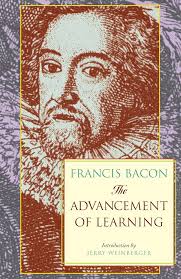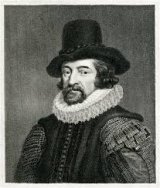The Advancement of Learning Page #31
The Advancement of Learning, published by Francis Bacon in 1605, is a foundational text in the history of science and philosophy. In this work, Bacon advocates for empirical research and the systematic organization of knowledge, laying the groundwork for the scientific method. The book critiques existing scholarly practices and proposes a new approach to learning based on observation and experimentation. It marks a significant shift towards modern scientific inquiry.
- Year:
- 1605
- 1,164 Views
Submitted by acronimous on August 11, 2024
Modified by acronimous on August 11, 2024
vertical point, opus quod operatur Deus à principio usque ad finem, the summary law of nature, we know not whether man’s inquiry can attain unto it. But these three be the true stages of knowledge, and are to them that are depraved no better than the giants’ hills:— “Ter sunt conati imponere Pelio Ossam, Scilicet atque Ossæ frondsum involvere Olympum.” But to those which refer all things to the glory of God, they are as the three acclamations, Sante, sancte, sancte! holy in the description or dilatation of His works; holy in the connection or concatenation of them; and holy in the union of them in a perpetual and uniform law. And, therefore, the speculation was excellent in Parmenides and Plato, although but a speculation in them, that all things by scale did ascend to unity. So then always that knowledge is worthiest which is charged with least multiplicity, which appeareth to be metaphysic; as that which considereth the simple forms or differences of things, which are few in number, and the degrees and co-ordinations whereof make all this variety. The second respect, which valueth and commendeth this part of metaphysic, is that it doth enfranchise the power of man unto the greatest liberty and possibility of works and effects. For physic carrieth men in narrow and restrained ways, subject to many accidents and impediments, imitating the ordinary flexuous courses of nature. But latæ undique sunt sapientibus viæ; to sapience (which was anciently defined to be rerum divinarum et humanarum scientia) there is ever a choice of means. For physical causes give light to new invention in simili materia. But whosoever knoweth any form, knoweth the utmost possibility of superinducing that nature upon any variety of matter; and so is less restrained in operation, either to the basis of the matter, or the condition of the efficient; which kind of knowledge Solomon likewise, though in a more divine sense, elegantly describeth: non arctabuntur gressus tui, et currens non habebis offendiculum. The ways of sapience are not much liable either to particularity or chance. (7) The second part of metaphysic is the inquiry of final causes, which I am moved to report not as omitted, but as misplaced. And yet if it were but a fault in order, I would not speak of it; for order is matter of illustration, but pertaineth not to the substance of sciences. But this misplacing hath caused a deficience, or at least a great improficience in the sciences themselves. For the handling of final causes, mixed with the rest in physical inquiries, hath intercepted the severe and diligent inquiry of all real and physical causes, and given men the occasion to stay upon these satisfactory and specious causes, to the great arrest and prejudice of further discovery. For this I find done not only by Plato, who ever anchoreth upon that shore, but by Aristotle, Galen, and others which do usually likewise fall upon these flats of discoursing causes. For to say that “the hairs of the eyelids are for a quickset and fence about the sight;” or that “the firmness of the skins and hides of living creatures is to defend them from the extremities of heat or cold;” or that “the bones are for the columns or beams, whereupon the frames of the bodies of living creatures are built;” or that “the leaves of trees are for protecting of the fruit;” or that “the clouds are for watering of the earth;” or that “the solidness of the earth is for the station and mansion of living creatures;” and the like, is well inquired and collected in metaphysic, but in physic they are impertinent. Nay, they are, indeed, but remoras and hindrances to stay and slug the ship from further sailing; and have brought this to pass, that the search of the physical causes hath been neglected and passed in silence. And, therefore, the natural philosophy of Democritus and some others, who did not suppose a mind or reason in the frame of things, but attributed the form thereof able to maintain itself to infinite essays or proofs of Nature, which they term fortune, seemeth to me (as far as I can judge by the recital and fragments which remain unto us) in particularities of physical causes more real and better inquired than that of Aristotle and Plato; whereof both intermingled final causes, the one as a part of theology, and the other as a part of logic, which were the favourite studies respectively of both those persons; not because those final causes are not true and worthy to be inquired, being kept within their own province, but because their excursions into the limits of physical causes hath bred a vastness and solitude in that tract. For otherwise, keeping their precincts and borders, men are extremely deceived if they think there is an enmity or repugnancy at all between them. For the cause rendered, that “the hairs about the eyelids are for the safeguard of the sight,” doth not impugn the cause rendered, that “pilosity is incident to orifices of moisture—muscosi fontes, &c.” Nor the cause rendered, that “the firmness of hides is for the armour of the body against extremities of heat or cold,” doth not impugn the cause rendered, that “contraction of pores is incident to the outwardest parts, in regard of their adjacence to foreign or unlike bodies;” and so of the rest, both causes being true and compatible, the one declaring an intention, the other a consequence only. Neither doth this call in question or derogate from Divine Providence, but highly confirm and exalt it. For as in civil actions he is the greater and deeper politique that can make other men the instruments of his will and ends, and yet never acquaint them with his purpose, so as they shall do it and yet not know what they do, than he that imparteth his meaning to those he employeth; so is the wisdom of God more admirable, when Nature intendeth one thing and Providence draweth forth another, than if He had communicated to particular creatures and motions the characters and impressions of His Providence. And thus much for metaphysic; the latter part whereof I allow as extant, but wish it confined to his proper place. VIII. (1) Nevertheless, there remaineth yet another part of natural philosophy, which is commonly made a principal part, and holdeth rank with physic special and metaphysic, which is mathematic; but I think it more agreeable to the nature of things, and to the light of order, to place it as a branch of metaphysic. For the subject of it being quantity, not quantity indefinite, which is but a relative, and belongeth to philosophia prima (as hath been said), but quantity determined or proportionable, it appeareth to be one of the essential forms of things, as that that is causative in Nature of a number of effects; insomuch as we see in the schools both of Democritus and of Pythagoras that the one did ascribe figure to the first seeds of things, and the other did
Translation
Translate and read this book in other languages:
Select another language:
- - Select -
- 简体中文 (Chinese - Simplified)
- 繁體中文 (Chinese - Traditional)
- Español (Spanish)
- Esperanto (Esperanto)
- 日本語 (Japanese)
- Português (Portuguese)
- Deutsch (German)
- العربية (Arabic)
- Français (French)
- Русский (Russian)
- ಕನ್ನಡ (Kannada)
- 한국어 (Korean)
- עברית (Hebrew)
- Gaeilge (Irish)
- Українська (Ukrainian)
- اردو (Urdu)
- Magyar (Hungarian)
- मानक हिन्दी (Hindi)
- Indonesia (Indonesian)
- Italiano (Italian)
- தமிழ் (Tamil)
- Türkçe (Turkish)
- తెలుగు (Telugu)
- ภาษาไทย (Thai)
- Tiếng Việt (Vietnamese)
- Čeština (Czech)
- Polski (Polish)
- Bahasa Indonesia (Indonesian)
- Românește (Romanian)
- Nederlands (Dutch)
- Ελληνικά (Greek)
- Latinum (Latin)
- Svenska (Swedish)
- Dansk (Danish)
- Suomi (Finnish)
- فارسی (Persian)
- ייִדיש (Yiddish)
- հայերեն (Armenian)
- Norsk (Norwegian)
- English (English)
Citation
Use the citation below to add this book to your bibliography:
Style:MLAChicagoAPA
"The Advancement of Learning Books." Literature.com. STANDS4 LLC, 2025. Web. 8 Mar. 2025. <https://www.literature.com/book/the_advancement_of_learning_3165>.








Discuss this The Advancement of Learning book with the community:
Report Comment
We're doing our best to make sure our content is useful, accurate and safe.
If by any chance you spot an inappropriate comment while navigating through our website please use this form to let us know, and we'll take care of it shortly.
Attachment
You need to be logged in to favorite.
Log In